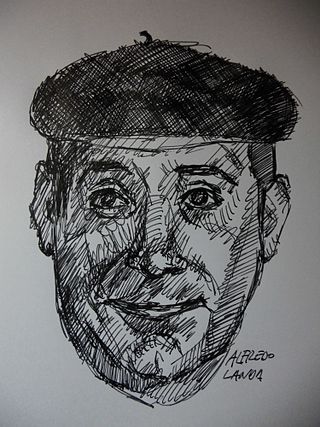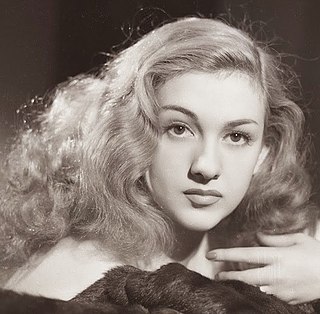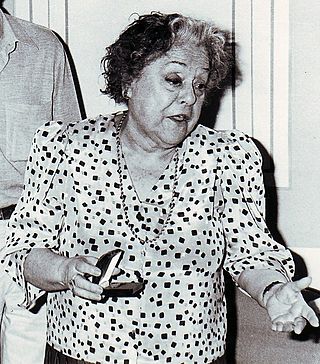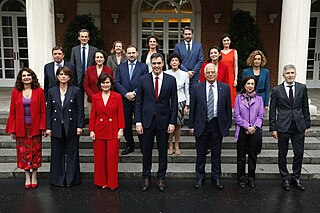
Alfredo Landa AretaMML was a Spanish actor.

María Amparo Rivelles Ladrón de GuevaraMML, better known as Amparo Rivelles, was a Spanish actress.

Concepción Velasco Varona, known professionally as Concha Velasco, also Conchita Velasco, was a Spanish actress, singer, dancer, television presenter, and theatrical producer. She received numerous accolades throughout her career in film, theater, and television spanning over six decades, including two National Theater Awards presented by the Spanish Ministry of Culture in 1972 and 2016, the Lifetime Achievement Award presented by the Spanish Television Academy in 2009, and the Honorary Goya Award presented by the Spanish Film Academy in 2012.

Rafaela Díaz ValienteMML better known as Rafaela Aparicio was a famous Spanish film and theatre actress.

María del Carmen García Galisteo, known professionally as Carmen Sevilla, was a Spanish actress, singer, and dancer. She began her career in the 1940s and became one of the most popular and highest paid stars of Spanish cinema until the 1970s. In 1991, at the age of sixty, she began her career as a television presenter, working for the three major Spanish networks until her retirement in 2010. At the time of her death, she was one of the last surviving stars from the Golden Age of Mexican cinema and from the Golden Age of Hollywood.

Narciso Ibáñez Serrador, also known as Chicho Ibáñez Serrador or by the pen name Luis Peñafiel, was a Spanish television, film and theater director, actor and screenwriter. He received many accolades throughout his career including the Lifetime Achievement Award presented by the Spanish Television Academy in 2002, the National Television Award presented by the Spanish Ministry of Culture in 2010 and the Honorary Goya Award presented by the Spanish Film Academy in 2018.
The Gold Medal of Merit in the Fine Arts is awarded by the Ministry of Culture and Sport of Spain to individuals or institutions excelling in artistic or cultural creation or to those that have provided valuable services to promotion of art and culture or to conservation of artistic heritage.

The first government of Pedro Sánchez was formed on 7 June 2018, following the latter's election as Prime Minister of Spain by the Congress of Deputies on 1 June and his swearing-in on 2 June, as a result of the success of a motion of no confidence against Mariano Rajoy. It succeeded the second Rajoy government and was the Government of Spain from 7 June 2018 to 13 January 2020, a total of 585 days, or 1 year, 7 months and 6 days.
This is the results breakdown of the local elections held in Castile and León on 24 May 2015. The following tables show detailed results in the autonomous community's most populous municipalities, sorted alphabetically.
This is the results breakdown of the local elections held in Castile and León on 26 May 2019. The following tables show detailed results in the autonomous community's most populous municipalities, sorted alphabetically.
Francisco Gómez de Llano (1896–1970) was a Spanish politician and diplomat. In Francoist Spain, he served as Minister of Finance (1951–1957) and as Ambassador to the Holy See (1957–1962).

The first government of José Luis Rodríguez Zapatero was formed on 18 April 2004, following the latter's election as Prime Minister of Spain by the Congress of Deputies on 16 April and his swearing-in on 17 April, as a result of the Spanish Socialist Workers' Party (PSOE) emerging as the largest parliamentary force at the 2004 Spanish general election. It succeeded the second Aznar government and was the Government of Spain from 18 April 2004 to 14 April 2008, a total of 1,457 days, or 3 years, 11 months and 27 days.

The first government of Mariano Rajoy was formed on 22 December 2011, following the latter's election as Prime Minister of Spain by the Congress of Deputies on 20 December and his swearing-in on 21 December, as a result of the People's Party (PP) emerging as the largest parliamentary force at the 2011 Spanish general election. It succeeded the second Zapatero government and was the Government of Spain from 22 December 2011 to 4 November 2016, a total of 1,779 days, or 4 years, 10 months and 13 days.

The fourth government of Felipe González was formed on 14 July 1993, following the latter's election as Prime Minister of Spain by the Congress of Deputies on 9 July and his swearing-in on 13 July, as a result of the Spanish Socialist Workers' Party (PSOE) emerging as the largest parliamentary force at the 1993 Spanish general election. It succeeded the third González government and was the Government of Spain from 14 July 1993 to 6 May 1996, a total of 1,027 days, or 2 years, 9 months and 22 days.

The second government of Pedro Sánchez was formed on 13 January 2020, following the latter's election as Prime Minister of Spain by the Congress of Deputies on 7 January and his swearing-in on 8 January, as a result of the Spanish Socialist Workers' Party (PSOE) emerging as the largest parliamentary force at the November 2019 general election. It succeeded the first Sánchez government and was the Government of Spain from 13 January 2020 to 21 November 2023, a total of 1,408 days, or 3 years, 10 months and 8 days.
José Luis García Ferrero was a Spanish veterinarian and politician.

The eighth government of Francisco Franco was formed on 30 October 1969, after the latter had sacked 13 out of 18 of his ministers—in what was to become the largest cabinet reshuffle in the whole Francoist period—as a result of internal divisions between the various factions within the National Movement and the unveiling of the Matesa scandal earlier that year. It succeeded the seventh Franco government and was the Government of Spain from 30 October 1969 to 9 June 1973, a total of 1,318 days, or 3 years, 7 months and 10 days.
Xosé Ramón Ónega López, known in Spanish as José Ramón Ónega López, was a Spanish journalist and politician.












